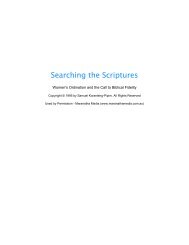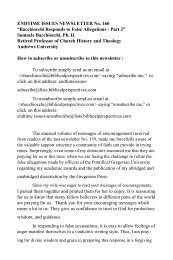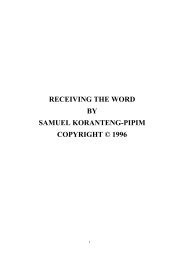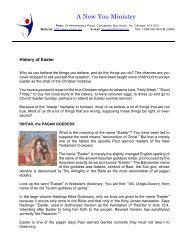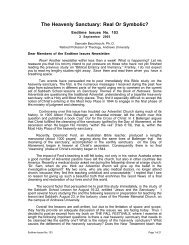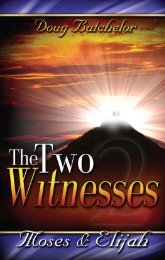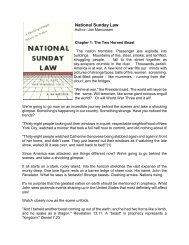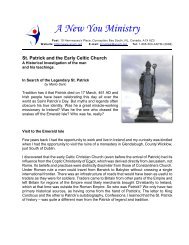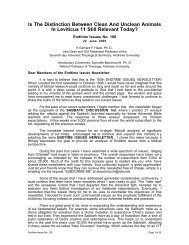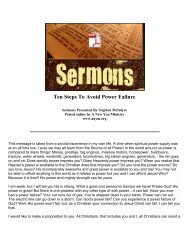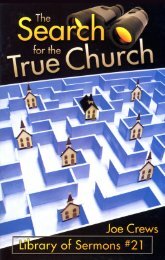Bible Readings for the Home Circleâ1914 - A New You Ministry
Bible Readings for the Home Circleâ1914 - A New You Ministry
Bible Readings for the Home Circleâ1914 - A New You Ministry
Create successful ePaper yourself
Turn your PDF publications into a flip-book with our unique Google optimized e-Paper software.
BIBLE READINGS<br />
16. What was finally done with Daniel<br />
“Then <strong>the</strong> king commanded, and <strong>the</strong>y brought Daniel, and cast him<br />
into <strong>the</strong> den of lions.” Verse 16.<br />
17. What did Darius say to Daniel <strong>the</strong> next morning when he came to<br />
<strong>the</strong> lions’ den<br />
“The king spake and said to Daniel, O Daniel, servant of <strong>the</strong> living<br />
God, is thy God, whom thou servest continually, able to deliver <strong>the</strong>e from<br />
<strong>the</strong> lions” Verse 20.<br />
18. What was Daniel’s reply<br />
“Then said Daniel unto <strong>the</strong> king, O king, live <strong>for</strong>ever. My God hath<br />
sent His angel, and hath shut <strong>the</strong> lions’ mouths, that <strong>the</strong>y have not hurt me:<br />
<strong>for</strong>asmuch as be<strong>for</strong>e Him innocency was found in me; and also be<strong>for</strong>e<br />
<strong>the</strong>e, O king, have I done no hurt.” Verses 21, 22.<br />
NOTE .— Here again was demonstrated by a most remarkable miracle,<br />
wrought in <strong>the</strong> face of <strong>the</strong> greatest nation <strong>the</strong>n in existence, that with<br />
<strong>the</strong> directing, prescribing, proscribing, or interfering with religion or<br />
its free exercise, civil governments can of right have nothing whatever<br />
to do; that religion is an individual matter, and should be left to <strong>the</strong><br />
dictates of each one’s own conscience.<br />
19. Be<strong>for</strong>e leaving His disciples, what command did Christ give <strong>the</strong>m<br />
“Go ye into all <strong>the</strong> world, and preach <strong>the</strong> gospel to every creature.”<br />
Mark 16:15.<br />
20. What counter-command did <strong>the</strong> Jewish Sanhedrin soon afterward<br />
give <strong>the</strong>m<br />
“And <strong>the</strong>y called <strong>the</strong>m, and commanded <strong>the</strong>m not to speak at all nor<br />
teach in <strong>the</strong> name of Jesus.” Acts 4:18.<br />
21. What reply did Peter and John make<br />
“But Peter and John answered and said unto <strong>the</strong>m, Whe<strong>the</strong>r it be right in<br />
<strong>the</strong> sight of God to harken unto you more than unto God, judge ye. For we<br />
cannot but speak <strong>the</strong> things which we have seen and heard.” Verses 19, 20.<br />
22. For continuing to preach Jesus, what did <strong>the</strong> Jewish rulers do to<br />
<strong>the</strong> apostles<br />
“Then <strong>the</strong> high priest rose up, and all <strong>the</strong>y that were with him, (which<br />
is <strong>the</strong> sect of <strong>the</strong> Sadducees,) and were filled with indignation, and laid<br />
<strong>the</strong>ir hands on <strong>the</strong> apostles, and put <strong>the</strong>m in <strong>the</strong> common prison.” Acts<br />
5:17, 18. {480<br />
480}<br />
23. What did an angel of God <strong>the</strong>n do<br />
“But <strong>the</strong> angel of <strong>the</strong> Lord by night opened <strong>the</strong> prison doors, and<br />
brought <strong>the</strong>m <strong>for</strong>th, and said, Go, stand and speak in <strong>the</strong> temple to <strong>the</strong><br />
people all <strong>the</strong> words of this life.” Verses 19, 20.<br />
NOTE .— Here once again is demonstrated <strong>the</strong> fact that men have no<br />
THE POWERS THAT BE<br />
right to interfere with <strong>the</strong> free exercise of religion, and that when <strong>the</strong><br />
laws of men conflict with <strong>the</strong> law and Word of God, we are to obey <strong>the</strong><br />
latter, whatever <strong>the</strong> consequences may be. God Himself has set <strong>the</strong><br />
seal of His approval to such a course. John Bunyan was imprisoned<br />
<strong>for</strong> twelve years <strong>for</strong> daring to preach <strong>the</strong> gospel contrary to law.<br />
24. Upon <strong>the</strong> apostles being called be<strong>for</strong>e <strong>the</strong> council again, what<br />
question did <strong>the</strong> high priest ask <strong>the</strong>m<br />
“Did not we straitly command you that ye should not teach in this<br />
name and, behold, ye have filled Jerusalem with your doctrine, and intend<br />
to bring this man’s blood upon us.” Verse 28.<br />
25. What reply did <strong>the</strong> apostles make<br />
“Then Peter and <strong>the</strong> o<strong>the</strong>r apostles answered and said, We ought to<br />
obey God ra<strong>the</strong>r than men.” Verse 29.<br />
NOTE .— “Obedience is to be rendered to all human governments, in<br />
subordination to <strong>the</strong> will of God. These governments are a recognized<br />
necessity, in <strong>the</strong> nature of <strong>the</strong> case, and <strong>the</strong>ir existence is manifestly in<br />
accordance with <strong>the</strong> divine will. Hence <strong>the</strong> presumption is always in<br />
favor of <strong>the</strong> authority of civil law, and any refusal to obey must be<br />
based on <strong>the</strong> moral proof that obedience will be sin. . . . It is still true<br />
that obedience to human law often involves sin against God and man.<br />
There are cases so clear that no one can question <strong>the</strong> duty to refuse<br />
obedience. In all times and in all lands such cases have arisen.” “It is<br />
too obvious to need discussion, that <strong>the</strong> law of God, <strong>the</strong> great principle<br />
of benevolence, is supreme, and that ‘we ought to obey God<br />
ra<strong>the</strong>r than men’ in any case of conflict between human law and <strong>the</strong><br />
divine.” “Moral Philosophy,” by James H. Fairchild, pages 178–<br />
181.<br />
26. Who is higher than <strong>the</strong> “higher powers”<br />
“If thou seest <strong>the</strong> oppression of <strong>the</strong> poor, and violent perverting of judgment<br />
and justice in a province, marvel not at <strong>the</strong> matter: <strong>for</strong> He that is higher<br />
than <strong>the</strong> highest regardeth; and <strong>the</strong>re be higher than <strong>the</strong>y.” Eccl. 5:8.<br />
NOTE .— In attempting to defend <strong>the</strong> right of civil government to<br />
en<strong>for</strong>ce religious observances by law, some still ask, “Shall we not<br />
obey <strong>the</strong> powers that be” We answer, “Yes, when <strong>the</strong>y are in harmony<br />
with <strong>the</strong> higher powers that be. God made His law <strong>for</strong> all <strong>the</strong><br />
universe. He created man; He gives <strong>the</strong> bounteous provisions of nature,<br />
and holds our breath and life in His hand. He is to be recognized,<br />
His law honored, be<strong>for</strong>e all <strong>the</strong> great men and <strong>the</strong> highest earthly<br />
powers.”<br />
27. Because Mordecai refused to bow down to Haman in accordance<br />
with <strong>the</strong> command of King Ahasuerus (Es<strong>the</strong>r 3:1–6), {481<br />
481} what<br />
decree did Haman succeed in having <strong>the</strong> king issue and send to every<br />
province throughout <strong>the</strong> Persian Empire




